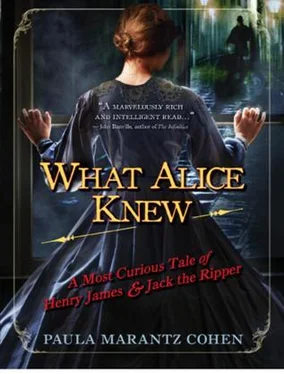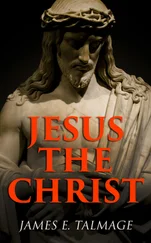William would have liked to tell him to pray—a minister would tell him that—but he was not a minister. He said nothing. He only stared at the man before him, not knowing what to do or what to expect.
It was Henry who knew. As a novelist, he trafficked in endings, and he had found that life and art were not so very different in that respect. Besides, he had heard the sound of shouts outside the shop and could see that Newsome had heard them too. Abberline had found them; he would be inside in a moment, but it would be too late.
Henry averted his eyes, but William, who did not realize what would happen, saw it, in what seemed slow motion: the glint of steel against the pale throat, the slash, first only a sweep of the hand, then a red line, then a gush of vermilion.
By the time Abberline and his men clambered down the stairs, Peter Newsome’s body, his hand still clutching the knife, lay slumped on the floor beside a pile of newly stretched canvases.
Jack the Ripper was dead.
London. 1911.
Henry gazed around the gallery, looking for people he knew. Some seemed familiar. Perhaps he had met them at dinner parties or seen their pictures in magazines, but they were so young; really, too young for him to know. Beside him stood Sargent, his tall frame more hunched than usual. It was clear that John would have preferred not to be there at all.
“You know I don’t like to go out,” he had told Henry when the invitation had come. He had grown reclusive since the death of his mother and sister, content only during his sojourns to America, when he was painting the ceiling of the Boston Public Library. It was as though all the portraits he had painted had soured him on people’s faces.
Henry, by contrast, craved society even more now than he had in his youth. He had purchased a home in Sussex, where he lived most of the year, but he looked forward to his visits to London. The social chitchat was a relief from the locutions of his writing, which had grown more complex as he grew older. The weight of his verbiage was like his physical weight. It too grew greater every year, as Alice would have noted with disapproval. There was the weight of loneliness as well. Life in the country exacerbated it. When he wasn’t working, he had a tendency to brood, to recall a past that he could not change, that unlike his writing, he could not qualify or amplify with words.
The invitation to this event had been particularly welcome. It had brought to mind the great adventure of twenty-three years earlier. Henry touched his throat retrospectively, recalling the madman’s knife. How dreadful it had been, but how wonderful, a sublime interlude of family solidarity, a return of sorts to a childhood idyll.
They were both gone now, his brother and sister. Alice had been first; she had succumbed to a cancerous lesion on the breast, a paradoxical ailment, given the gruesome memento she had received from that notorious killer. But when the diagnosis had come, she had seemed almost pleased. She said she welcomed an illness that had the good taste to be real and malignant. “All those years in bed with nothing wrong with me. It’s a relief to finally suffer in a way that people can understand.”
In the time that remained, she had rarely spoken of the Ripper investigation. When reference was made to the case, she changed the subject or announced she had a headache. And though Sargent would occasionally bring over his paintings for her to look at, she lost her interest in the fine arts. She ceased to follow the gallery shows and exhibitions or ask for the art-world gossip as she used to.
One incident during this period stood out for Henry. It had occurred one afternoon toward the beginning of her illness. She already understood the gravity of her condition, but the pain had not yet become debilitating, and the sickness seemed to make her, if possible, more alert than ever. They would spend some of their pleasantest moments together during this time, whiling away the hours, as she macabrely put it, awaiting the Angel of Death.
On this particular day, she was propped up in bed sipping a cup of tea in which she had added a generous quantity of brandy. Henry sat nearby reading the paper; he had taken his brandy without the tea. There was an air of mild debauchery in the air. Katherine was off visiting her sister’s family, and the siblings both felt free to drink not only earlier, but more than they normally would.
The girl, Felicity, had entered the room with the post. She had replaced Sally, who a few months earlier had taken a position as a downstairs cook in a grand establishment, where Archie, under the guise of being her brother, had been employed as well, possibly as assistant to the footman.
Alice had taken the letters from the girl and settled back to examine them. Although ostensibly occupied with his newspaper, Henry watched her out of the corner of his eye, as he often watched people when they were not aware of his doing so. On this occasion, he found his attention repaid. As he watched her flip through the post, he was struck by the sudden hardening of her features and the quick, almost brutal gesture with which she cut open one of the letters, glanced at the card inside, and then crumpled it in her hand. Later, when she went to do her necessaries, he reached under the blanket and found the crumpled card. It was an invitation to Sickert’s latest gallery exhibition. Across the top, in red ink, were the scrawled words “Please exert yourself and come—or I shall be desolate. WS.”
Her reaction had served as a cue. Walter Sickert would come to represent, for Henry, a private place in his sister’s emotional life. He would never know what the actual contents of that place consisted of; indeed, he had no wish to know, only that the place, heavily guarded and under lock and key, was there.
***
As for William, Henry had seen him at intervals since that exciting time, but these were short visits, hardly more than glimpses. William was much in demand by the scientific world and rarely available. Their longest time together had been a year ago, when his brother had made the crossing to consult a specialist on the Continent. He and his Alice had stopped over to stay with Henry in Sussex. The problem, William confided, was with his heart, an organ one thought nothing of, at least in the literal sense, until it failed. So much of life was like that.
In the final month of his brother’s life, Henry traveled to America to wait by his bedside. William had clung to his wife in those last weeks, never wanting her out of his sight, demanding that she read to him, bring him his papers, or take down his thoughts as the whim struck. It should have been trying—Henry could not have stood it—but William’s Alice was unstinting in her devotion. She did not complain and, indeed, seemed to enjoy these ministrations. It gave Henry pause. If only one could be certain to predecease one’s spouse, it might be worth all the bother to have a woman like that, constant and attentive, to ease the final passage.
It had all gone well enough, considering that it was death and the end. “He’s had more dire episodes than this,” his Alice had noted. Henry agreed. William’s fear had never been of death but of madness. He had always worried that he would succumb to another episode like the one he had suffered in his youth. It had not occurred. He had passed into the great unknown with dignity and quietness, rather in the manner one might have expected of a lawyer or a stockbroker.
His students flocked to the funeral. He was much loved, or at least in theory. Not that William wasn’t lovable, Henry thought, only that the many who claimed to love him had no idea what he was really like. But then, who could know another in any essential way? It was the great advantage of the writer to create characters and thereby know them fully. But with regard to real human beings, one saw only the outer shell.
Читать дальше












